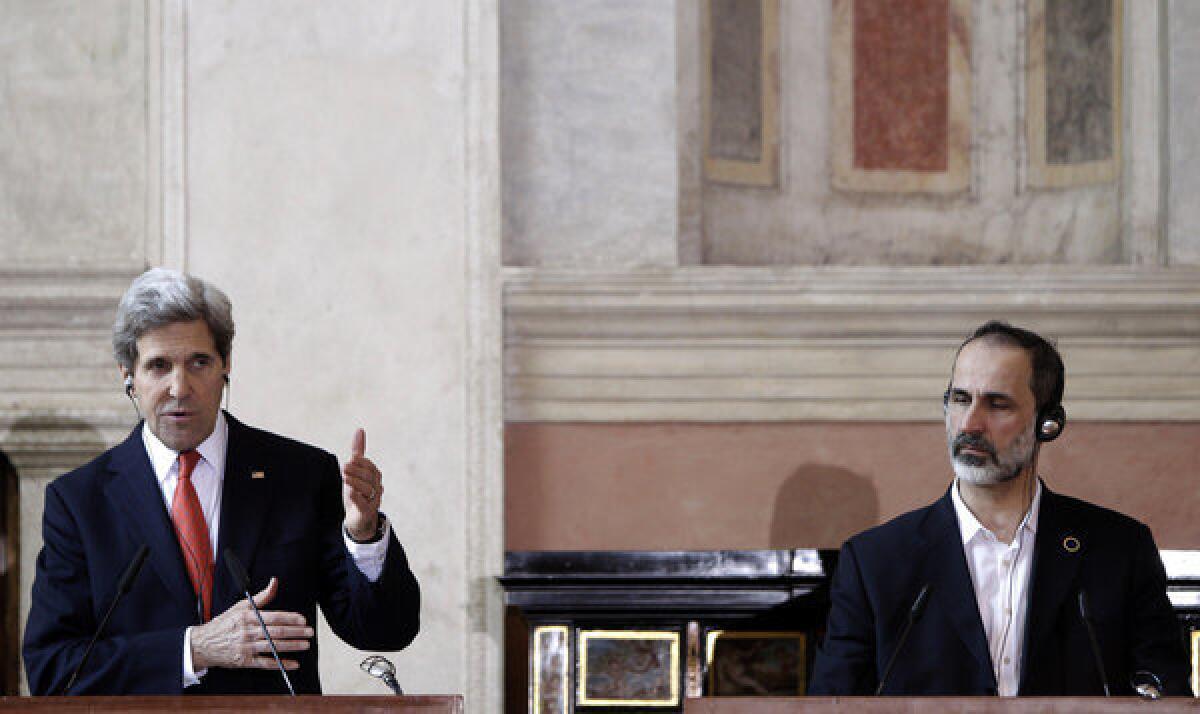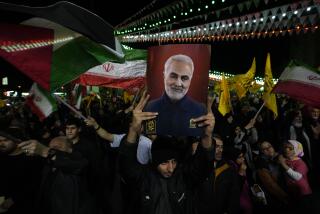Syrian opposition leader Moaz Khatib resigns

BEIRUT — The head of the major, U.S.-backed Syrian opposition coalition resigned his post Sunday, a blow to a group that the United States and other nations have called the legitimate representative of the Syrian people.
The departure of the charismatic Moaz Khatib again highlights how Syrian dissidents have failed to surmount the deep fissures that have long divided the opposition movement.
In Sunday’s statement, Khatib said he had always maintained he would step down if certain “red lines” were crossed, but he provided no specifics — a void that triggered frantic speculation on social media.
Khatib, a former preacher at the historic Umayyad mosque in Damascus, said he planned to “work with freedom that cannot be provided within official institutions.”
In his statement, he assailed the government of Syrian President Bashar Assad for its brutality and intransigence, and seemed to express little hope that an end was near for a two-year conflict that has cost tens of thousands of lives and sent more than 1 million Syrians fleeing the country.
“The regime, with its recklessness, has lost the most valuable of chances for comprehensive national reconciliation,” said Khatib, widely regarded as a moderate Islamist who has repeatedly called for reconciliation among Syria’s various religious and ethnic groups.
In his statement, Khatib also criticized the international community for not providing Syrians with sufficient means to “defend themselves.”
He and other opposition leaders have called on the United States and its allies to provide arms to the Syrian opposition. The White House has publicly declined, fearing in part that the weapons could end up in the hands of Al Qaeda-linked militants.
It was no secret that Khatib had clashed with fellow members of the umbrella organization that he headed, known formally as the National Coalition for Syrian Revolutionary and Opposition Forces.
Some Syrians have criticized the coalition as a tool of the Muslim Brotherhood, the Islamist organization, and beholden to Qatar, Saudi Arabia and Turkey, which have bankrolled and otherwise subsidized the anti-Assad forces. The coalition was formed in November in Qatar as part of an effort to present an organized front for the fractious Syrian dissident movement. The group was supposed to serve as a kind of government in exile, a conduit for foreign aid and an overseer of military operations inside Syria. The coalition has yet to achieve its grandiose ambitions, however.
The naming of Khatib as the coalition’s president was widely hailed. Unlike many other exiled dissidents, he had until recently been living in Syria, had participated in anti-Assad protests and had been jailed for his activism before fleeing the country and settling in Cairo.
Still, the coalition has remained largely an exile entity; its support inside Syria appears tenuous at best. The group is self-appointed; there were no elections inside war-ravaged Syria to choose coalition leaders. Scores of autonomous rebel groups lacking a central command and not answerable to the coalition are fighting inside Syria to topple Assad’s government. There are also nonviolent opposition factions not affiliated with the coalition.
In February, Khatib stunned many when he said publicly that, in a bid to stop the violence, he would be willing to negotiate with members of Assad’s government. The coalition had previously said that Assad’s exit was a precondition before any peace talks could began. On a trip to Europe, Khatib also met with officials from Russia and Iran, Assad’s two closest foreign allies, and reiterated his willingness to engage in talks.
Coalition members publicly disassociated themselves with Khatib’s offer and several stressed that he was acting on his own. Khatib was eventually forced to back down and issued a clarification saying that any talks must lead to Assad’s ouster — a position unacceptable to the Syrian government, which has no intention of entering into talks guaranteed to insure its own demise. Since that episode, many observers have questioned whether Khatib had been sidelined in the opposition leadership scheme.
Still, Khatib had remained the public face of the Syrian exiled opposition and met publicly in late February with U.S. Secretary of State John Kerry in Rome.
Last week, the coalition elected a Damascus-born naturalized U.S. citizen, Ghassan Hitto, to serve as prime minister of rebel-held areas inside Syria. Hitto, a little-known technology executive, has spent much of the past three decades living in Texas.
Some coalition activists suspended their participation to protest Hitto’s appointment. Several rebel militias fighting inside Syria have already reportedly declared that they do not recognize Hitto’s authority.
Upon his election, the new opposition premier immediately declared he would not hold any negotiations with Assad’s government. Unlike Khatib, Hitto displayed a willingness to adhere to the coalition’s official position on the touchy issue of peace talks.
ALSO:
In Baghdad, Kerry urges a halt to Iran-Syria flights
Obama defends U.S. approach to Syrian conflict
Israeli police dismantle Palestinian protest village
Special correspondent Bulos reported from Amman, Jordan.
More to Read
Start your day right
Sign up for Essential California for news, features and recommendations from the L.A. Times and beyond in your inbox six days a week.
You may occasionally receive promotional content from the Los Angeles Times.







